- Home
- Holly Black
Bad Seeds: Evil Progeny Page 3
Bad Seeds: Evil Progeny Read online
Page 3
“The candy’s upstairs, Jimmy. I left it on the kitchen table.”
Jimmy thumbed the brim of a military cap that was much too large for his head. He’d made Maddie buy the cap at an army surplus store, and it was the smallest size available. “I’ll grow into it.” That’s what he’d said, smiling, but he wasn’t smiling now.
Maddie managed a grin. “The candy, Jimmy. You remember—”
“Of course I remember! I only wish that you’d remember to call me the right thing!”
“I’m sorry, general.” Maddie straightened. “The candy—the supplies—are upstairs in the mess hall.”
Jimmy seemed pleased. “Very good. Bring the supplies down here, and we’ll begin Operation Trojan Horse.”
Maddie stared at the black sea on the cement floor, imagining a million eyes focused on her. She wouldn’t walk among them. Not when she could see them clearly, not when she could feel them scuttling over her feet.
“I don’t want to do that,” she said.
The boy’s lips twisted into a cruel smile. “Maybe you’d rather have me send a few squads to your bedroom tonight, like the last time you disobeyed a direct order. You won’t get much sleep with a jillion little feet crawling all over you … ”
“Jimmy!” She stared at him, revolted by his black insect eyes, and then turned away.
She got the candy.
Jimmy used a penknife to make tiny holes in the packages. His troops climbed inside, listening to their leader talk of conquest and the Trojan Horse and the birth of a new order. He told them the best places to hide in a house and reminded the scouts that he must be kept informed at all times concerning the progress of their mission.
And when they were all in place, why then …
Silently, Maddie climbed the stairs. Rainwater ran down the front window, drooling from the rusty gutters above. The street outside was slick and black. The sidewalks were empty, gray; a flotilla of fallen leaves swam in the cement gutters. Maddie watched the leaves and imagined hundreds of little monsters washed into their homes by a great wave.
She looked down and saw her son’s face mirrored in the window. His reflection was smeared with rain, sad, his straight lips twisted into a dripping frown, his black eyes deep pools overflowing high cheekbones. He exhaled sharply and the image fogged over.
“They just told me,” he whispered. “It took them a long time to get out of the car. I guess you think that was pretty smart, closing the vents and all.”
Maddie said nothing. She stared at the foggy spot on the window. Just a glimpse, she thought. Just a glimpse, but it was a clown’s face I saw.
“I never thought about this.” Jimmy stared out at the rain. “They aren’t coming, are they?”
“Not tonight.”
Jimmy whispered, “Not tonight, troops. Operation Trojan Horse is scrubbed.”
Maddie took a deep breath, hating the air, hating the stink of sugar. She thought about the little clown she’d seen mirrored in the rain-washed window, and she thought about the other Jimmy, the little ghoul, safe and dry in front of a TV set.
Tiny antennae probed Maddie’s heel. Tiny feet, sticky with chocolate, marched over her toes.
The rain came harder now, in sheets. Jimmy brushed his troops away from his mother’s feet. He rose and took her hand. Mirrored in the window, his lips were straight, his jaw firm.
God, it’s been so long since he touched me, she thought, but she said, “Jimmy, let’s watch television.”
He nodded, studying the rain, not really listening.
His eyes narrowed until Maddie couldn’t see them anymore.
“Next year,” he said, his grip tightening.
The Family
Halli Villegas
The family’s house was a rambling white-frame farmhouse set on a hill. It had attics and dormers and porches. To her it seemed like there were twenty, forty, even fifty children in the family, but the actual count was thirteen. Like a family of rabbits in a warren on the hill, instead of underneath it. Not all the children lived at home; a few were off at university or had jobs in the city, but there were still enough to make the house feel perpetually in chaos.
Adelaide was a distant cousin, spending the summer with the family ostensibly as a sort of babysitter, but the parents were never far from home. The children’s parents, Ruth and Jim, spent a good deal of their time in the outbuildings that served as their business, where they spun and dyed the wool from their own sheep, and then knit it into fabulous and bizarre sweaters, hats, scarves. Their company, Au Natural, was known for its striking colour combinations and the way they had of constructing the knit pieces so that they seemed to float, or to hang just ready to fall apart. They’d even had designers from Europe and fashion editors at the farm to see the pieces and order things for collections. These fashionable people always left delighted with the modesty of Ruth and Jim, who ran Au Natural like they ran their family, with a charming negligence and trust in the ability of everyone to pull their own weight. They were known as good neighbours, unpretentious successes, and the best of the new-era hippies who combined style with eco-awareness.
Adelaide had to admit that the children, despite their absolute lack of respect for her or any other authority figure except their parents, kept themselves constructively busy. They built tree forts, put together little books with their own drawings and collages, knitted doll clothes under the trees in the orchard, rode their horses wildly, but not recklessly, and cared for their rabbits, ducks, dogs, and cats without being reminded to. They were polite to Adelaide, but sometimes cut their eyes away when she was talking to them, to indulge in a secret amusement amongst themselves. Sometimes they would stare with wide-open eyes at her, as if she were speaking a foreign language when she tried to direct them to sit down at the table for lunch, or some such thing.
Then one of them would shout, “A picnic!” And before she could say anything they would grab blankets and pillows, the older children filling a large willow basket with leftovers and bottles of lemonade. A picnic would be spread beside the brook that meandered behind the house, under a tree, the children eating, talking about books they had read or the antics of their pets, while Adelaide sat helpless a way off on a large pillow thoughtfully set by them in the shade of the tree and watched. Often their parents would stumble on these idyllic scenes and smile and the children would surround them vying for attention, and Ruth or Jim would tell Adelaide she was doing a really terrific job, they were so happy she had joined them that summer and the children would look at her with their secretive eyes to see what she would say.
If she began to say, “Oh, it wasn’t … ” they would roar and start some sort of noisy sport, or begin to tickle her until everyone was laughing, but Adelaide could feel their hard fingers scratching at her under the guise of play and she wished that the summer was over.
One of the children in particular regarded Adelaide with absolute disdain. Her name was Mary Matilda, and she was sometimes called Mattie, and sometimes Mary Mat, or just M. Adelaide, in her own fit of rebelliousness, called her nothing but Mary Matilda. The little girl was about nine or ten, with a dark fringe of hair over her forehead and her mother’s blue eyes in a face still round with baby fat. But her skin, a matte white under the dark hair, and the eyebrows like a raven’s feather promised beauty later on. She never spoke to Adelaide unless pressed and always refused to do whatever Adelaide said—not with any anger, but with the calm assurance of authority. She would turn on her heel and go out to the stables or the yard, leaving Adelaide speechless. Adelaide didn’t dare grab hold of her arm or shoulder and call her back, because Mary Matilda was a great favourite among her siblings and they watched after one another with unusual devotion.
All the children were good riders, but Mary Matilda was the best of all. That summer she generally rode bareback. Adelaide would stand by the house while the children raced down the long winding drive overhung with trees on their horses. One of the boys, Edward, would lie along
one of the long tree limbs and wave a flag for them to start. The children would gallop down the drive, coming to such an abrupt stop at the end that their horses’ hindquarters, foamed with sweat, would seem to almost crumple under the effort.
Mary Matilda almost always won. The only one who could beat her was her older brother Matthew.
Adelaide complained to Ruth and Jim, worried that the children would get hurt.
Ruth laughed, and said, “The children have been riding since they were born.”
“Before, honey, before they were born. You were riding horses into your third trimester.” Jim laid his arm along his wife’s shoulders. “Just about gave old Doc Johnston a heart attack.” He looked at Adelaide and winked. “Don’t worry, Adelaide, we won’t hold you responsible if anyone breaks their neck on your watch.” Then he leaned over and kissed Ruth in a way that made Adelaide blush.
Matthew, at sixteen, was the oldest of the boys still at home. His eyes were reddish brown and quite large. He used them a lot when begging favours for himself: to go down to the creek at night, to sleep on the porch when it got too hot in his attic bedroom, favours that Adelaide knew he only asked her permission for as a courtesy. He would have done what he wanted anyway. Matthew would throw his long legs and arms into various attitudes of supplication as he lay down beside Adelaide on the grass and asked her what she was reading, or if she wanted lemonade, he grinned at her with white teeth, his eyes peering from beneath a flop of sandy curls. He asked Adelaide about her friends and the city where she went to school, propped his chin in his long-fingered hands while he listened, his oddly delicate wrist bones sticking well out from his too-small jersey sleeves.
Matthew was considerate of the younger children and played their games, let them sit on his knee while he read to them. On rainy days Mary Matilda and the others would fall in a heap on him while he sat on the old sofa in front of the fireplace in the living room and told stories.
Often while he was playing hide or seek with the children or croquet, he would leave the game and come and sit beside Adelaide to talk. Once he showed her a poem he had written, another time, he put an arm around her when they looked at a book Adelaide had brought from home. When she shrugged out from underneath, he had looked at her with the same wide eyes all the children had, guileless.
Adelaide did nothing to encourage his puppy crush, but admitted to herself she found it comforting amidst the general disregard the others treated her with.
The only house rule was that two hours in the afternoon, at the height of the day, was to be quiet time. The children were expected to go to their bedrooms and read, or sleep. None of the children ever disobeyed this rule and Adelaide was always surprised at how quietly and quickly they went up to their rooms and shut the doors. The house would fall silent, except for the sonorous ticking of the grandfather clock that stood in the entryway. Adelaide usually went out to the kitchen porch and sat on the porch swing, where she read, or looked out over the well-tended gardens and land of the family’s farm. Sometimes Matthew would join her, bringing a drink or a book and they would talk until the first of the children came down. He didn’t come all the time, not too often, because he said his parents would be disappointed if he did not set a good example for the younger children by keeping the one house rule.
When he did come, Adelaide found herself having fun for the first time that summer while she watched him goof around for her, imitating visitors to the farm, or when she caught him staring at her with his wide brown eyes, eager for her approval.
One night near the end of the summer, as the family sat at the long trestle table having dinner in the farmhouse kitchen, Ruth and Jim announced they had some news to share with them. The children, polite, attentive, listened while their parents told them that Marcus and Jane, their oldest siblings, would be coming home tomorrow. Secondly, Au Natural had just signed a contract with Devaughn, the British rock star, to provide dyed wools for the line of eco-correct clothing he and his wife had started, called Gardun, which would mean a trip to London for the whole family. Lastly, Ruth and Jim had decided to adopt a baby from Africa, a little girl whose father was dead from AIDS and whose mother could not afford to keep her any longer.
The children broke out in their own carefully controlled uproar, which always struck Adelaide as being somehow scripted.
“A baby? Can I name her?”
“I can’t wait to see Marcus and show him the new pony.”
“Is Jane bringing her boyfriend?”
“Are we going to be rich, Mummy?”
“Do you think we can go backstage to Devaughn’s show?”
Jim and Ruth laughed and answered questions animatedly, the fingers flying as they described various things, their arms flung out in gestures, with much theatrical hugging of the children closest to them.
Matthew winked at Adelaide, and she noticed that only Mary Matilda sat silent.
The next day during the quiet hours, Adelaide sat on the porch and waited for Matthew. She assumed his wink meant he wanted to talk to her about his parents’ news, that they shared a secret amusement at the whole thing. As she looked out over the garden and watched the small figure of Jim or Ruth, hard to tell from this distance, walk from shed to barn, she heard a step behind her. Adelaide turned and smiled, but it was Mary Matilda.
“Mary Matilda, it’s quiet time.” Adelaide felt a little tremor go through her—what if Matthew came down now and Mary Matilda saw and started a general mutiny? Matthew would never come down again during quiet time.
“I’m not sleepy.” Adelaide’s worry deepened. For that matter, what if Ruth or Jim came and saw Mary Matilda on the porch instead of in her room? They would know she had failed, that she had no authority over their so-well-behaved children.
“Mary Matilda, you don’t have to sleep. Just lie there and read. You know the rules.” Adelaide stood up.
Mary Matilda looked at her. “My necklace is caught in my hair and it pulls. Can you come upstairs and fix it.”
“I can fix it here, turn around.”
“No, upstairs.” Mary Matilda went in the house and Adelaide followed, knowing Mary Matilda was quite capable of causing uproar if it would make Adelaide look bad. She knew in that moment that the child in front of her, with the straight dark hair almost to her waist, the firm legs of an outdoor girl burnished with tan, the childish shoulder blades that fluttered under her striped t-shirt, hated Adelaide. Adelaide knew she hated this little girl right back, she wanted to slap her for her insolence. There was no corporal punishment allowed of course, but Adelaide felt that Mary Matilda and her attitude would only benefit from a few well-placed spankings.
When they came to Mary Matilda’s small room, a little cubby hole really, with roses on the wallpaper and a small bed with a chenille coverlet, an overflowing bookcase and dresser, a closet door ajar, she lost her temper.
“Mary Matilda, lie down right now.”
“My hair, it’s caught. It pulls. It hurts.”
Adelaide wheeled Mary Matilda around quickly, lifted her hair and saw that, just as she thought, the child wasn’t wearing a necklace.
“Get in that bed, or I’ll tell your parents.”
Mary Matilda’s face closed like a flower shutting for the night and she lay down rigid on her bed. Adelaide left the room and pulled the door almost shut behind her, not closing it so she could see if Mary Matilda was going to stay in her room. Adelaide would look for Matthew and tell him what happened so that if Mary Matilda made any more trouble, maybe he could stop it. She could see the little girl motionless on the bed, her white arm rigid at her side, and after a heartbeat, Adelaide began to walk down the hall.
Then she heard whispers.
Walking back silently to Mary Matilda’s door, wondering what trick the brat was playing on her now, she stopped just outside it and listened.
“Don’t worry, the bitch went back downstairs. Come on, M, I’ll let you win the next race.”
Through the crack she
saw his long limbs climbing on the narrow bed, the long-fingered hands tugging at something.
Standing in the hall frozen, her hand at her mouth, now she heard whispers all around her, heard the soft noises, like animals in their secret places, where there wasn’t any light.
The Horse Lord
Lisa Tuttle
The double barn doors were secured by a length of stout, rust-encrusted chain, fastened with an old padlock.
Marilyn hefted the lock with one hand and tugged at the chain, which did not give. She looked up at the splintering gray wood of the doors and wondered how the children had gotten in.
Dusting red powder from her hands, Marilyn strolled around the side of the old barn. Dead leaves and dying grasses crunched beneath her sneakered feet, and she hunched her shoulders against the chill in the wind.
“There’s plenty of room for horses,” Kelly had said the night before at dinner. “There’s a perfect barn. You can’t say it would be impractical to keep a horse here.” Kelly was Derek’s daughter, eleven years old and mad for horses.
This barn had been used as a stable, Marilyn thought, and could be again. Why not get Kelly a horse? And why not one for herself as well? As a girl, Marilyn had ridden in Central Park. She stared down the length of the barn: for some reason, the door to each stall had been tightly boarded shut.
Marilyn realized she was shivering, then, and she finished her circuit of the barn at a trot and jogged all the way back to the house.
The house was large and solid, built of gray stone 170 years before. It seemed a mistake, a misplaced object in this cold, empty land. Who would choose to settle here, who would try to eke out a living from the ungiving, stony soil.
The old house and the eerily empty countryside formed a setting very much like one Marilyn, who wrote suspense novels, had once created for a story. She liked the reality much less than her heroine had liked the fiction.
The big kitchen was warm and felt comforting after the outside air. Marilyn leaned against the sink to catch her breath and let herself relax. But she felt tense. The house seemed unnaturally quiet with all the children away at school. Marilyn smiled wryly at herself. A week before, the children had been driving her crazy with their constant noise and demands, and now that they were safely away at school for six hours she felt uncomfortable.

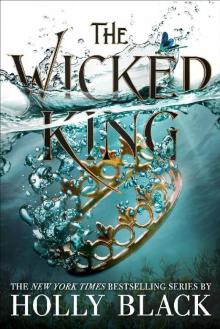 The Wicked King (The Folk of the Air #2)
The Wicked King (The Folk of the Air #2)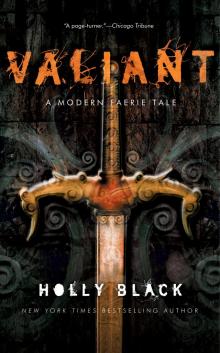 Valiant
Valiant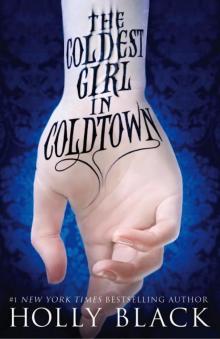 The Coldest Girl in Coldtown
The Coldest Girl in Coldtown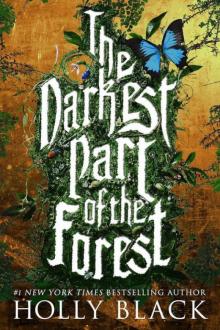 The Darkest Part of the Forest
The Darkest Part of the Forest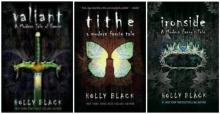 Tithe
Tithe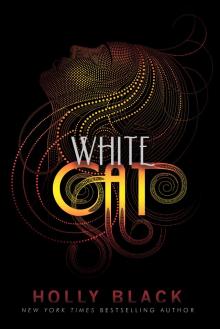 White Cat
White Cat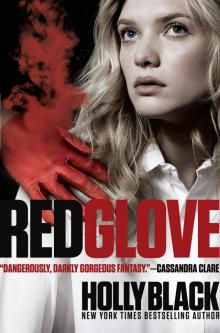 Red Glove
Red Glove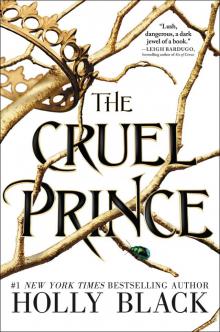 The Cruel Prince
The Cruel Prince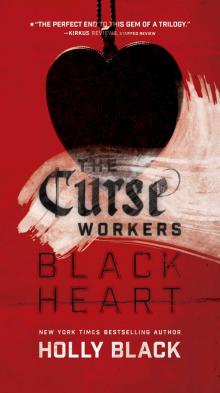 Black Heart
Black Heart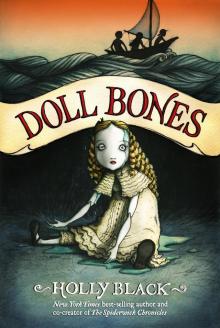 Doll Bones
Doll Bones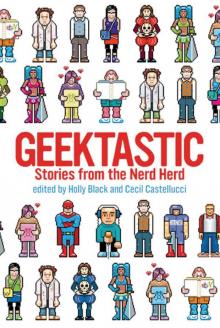 Geektastic: Stories from the Nerd Herd
Geektastic: Stories from the Nerd Herd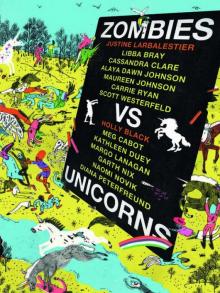 Zombies Vs. Unicorns
Zombies Vs. Unicorns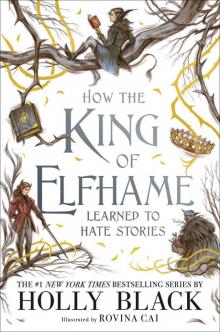 How the King of Elfhame Learned to Hate Stories
How the King of Elfhame Learned to Hate Stories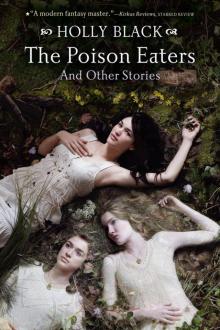 The Poison Eaters and Other Stories
The Poison Eaters and Other Stories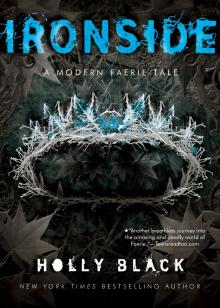 Ironside
Ironside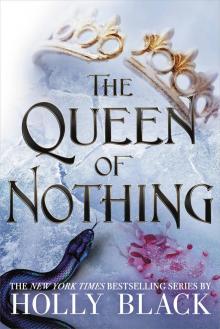 The Queen of Nothing
The Queen of Nothing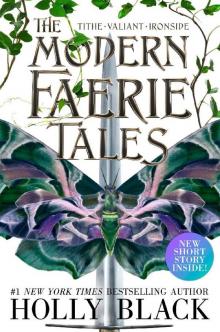 Modern Faerie Tales
Modern Faerie Tales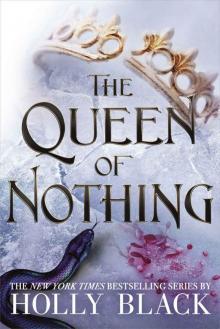 The Queen of Nothing (The Folk of the Air #3)
The Queen of Nothing (The Folk of the Air #3)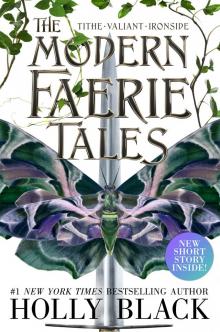 The Modern Faerie Tales
The Modern Faerie Tales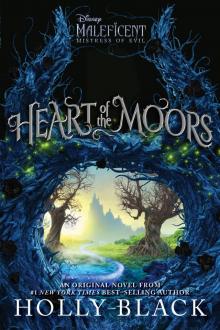 Heart of the Moors
Heart of the Moors The Golden Tower
The Golden Tower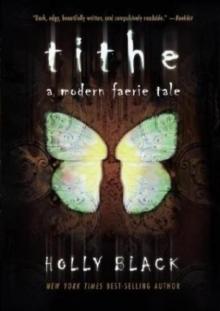 Tithe mtof-1
Tithe mtof-1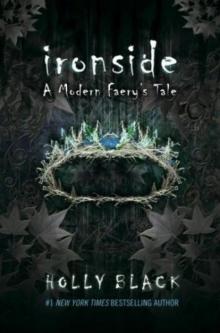 Ironside mtof-3
Ironside mtof-3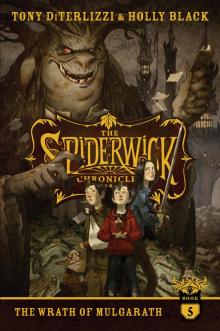 The Wrath of Mulgarath
The Wrath of Mulgarath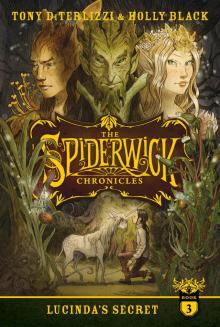 Lucinda's Secret
Lucinda's Secret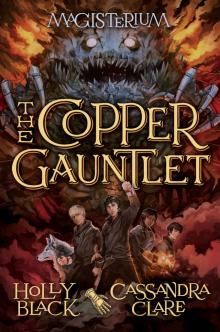 The Copper Gauntlet
The Copper Gauntlet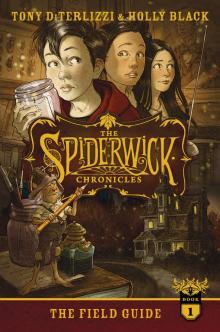 The Field Guide
The Field Guide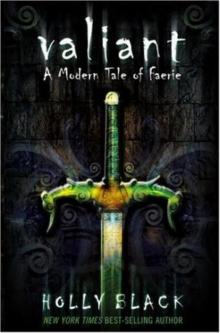 Valiant mtof-2
Valiant mtof-2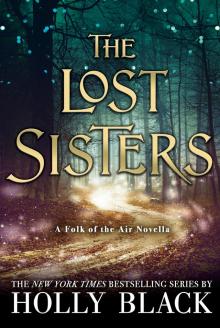 The Lost Sisters
The Lost Sisters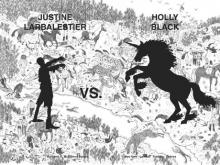 Zombies vs. Unicorns
Zombies vs. Unicorns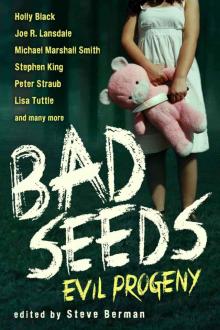 Bad Seeds: Evil Progeny
Bad Seeds: Evil Progeny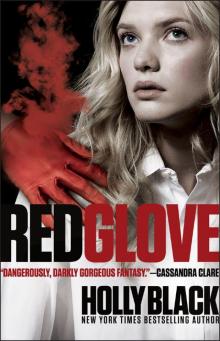 Red Glove (2)
Red Glove (2)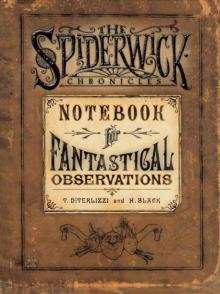 Notebook for Fantastical Observations
Notebook for Fantastical Observations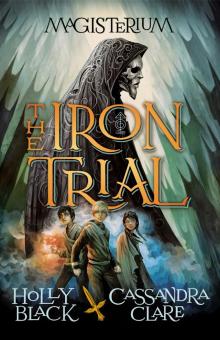 The Iron Trial
The Iron Trial Welcome to Bordertown
Welcome to Bordertown